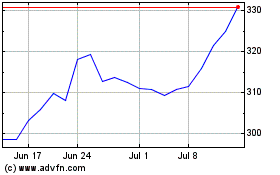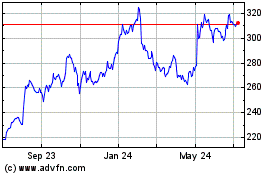Amgen Finds Data Falsified in Grizzly Bear Study
September 01 2015 - 12:40PM
Dow Jones News
A scientific paper that had captured widespread attention
because its subjects were massive grizzly bears was retracted on
Tuesday after one of the authors was said to have manipulated some
of the data.
The paper attracted news coverage around the world after its
publication in August 2014 in the journal Cell Metabolism, which
put on its cover an image of a grizzly bear clutching a fish
between its jaws.
The paper discussed how grizzly bears' metabolisms adjust to
hibernation, and the key role of a certain fat protein, which
offered a clue to a new kind of treatment for diabetes. Biotech
Amgen Inc. was working on the bear research to get a better grip on
the biology behind diseases like obesity and diabetes.
But Amgen said it discovered late last year, in reviewing the
computer files of one of its researchers, that some experimental
data cited in the Cell Metabolism paper had been changed in a way
the company said made some of the results look stronger.
Amgen and its collaborators at Washington State University and
the University of Idaho said they quickly asked Cell Metabolism for
a retraction. The journal then reviewed the matter, resulting in
the paper's retraction.
Amgen, along with researchers at Washington state's
bear-research center and the University of Idaho, said the data
manipulation was the work of a lone company scientist and didn't
affect the paper's overall finding about the bears' metabolisms.
Neither Amgen nor the university researchers would identify the
scientist, who has been fired.
"We know data were actually manipulated and that just cannot
stand," Alexander Kamb, Amgen's research chief, said in an
interview. Dr. Kamb wasn't an author of the paper.
"Amgen holds our scientists to the highest standards of ethical
research. Amgen has internal policies and practices in place to
prevent and detect this type of activity and we deeply regret this
circumstance. We extend our sincere apologies to the scientific
community," the biotech company said.
Lynne Nelson, one of the paper's lead authors who is a professor
of cardiology at Washington state, said its bear-research center
was stunned to learn of the doctoring from Amgen and is now
repeating the research itself to confirm the findings.
"We did nothing wrong, and we're still going to pursue the
hibernation physiology in bears because we think it's an important
thing to do," she said.
The paper had 12 authors, six of whom had worked for Amgen while
conducting the research. The senior author was Kevin Corbit. Dr.
Corbit said he was let go from Amgen for fabricating research "on
another matter." He said he fabricated that data to help a
co-worker in what he said was an isolated incident and a
regrettable decision.
He said he stands behind the grizzly-bear paper, and he believes
that "if independent experiments were conducted, as dictated by
proper scientific discourse, the work would be reproduced." He says
his co-authors have no involvement in any dispute over the
work.
Dr. Corbit's and Amgen's work was the subject of a 2013 article
in The Wall Street Journal about how bears could offer clues to the
mechanism of diseases like obesity and diabetes in humans. Grizzly
bears gain considerable weight and fat before going into
hibernation, but don't develop diabetes like some humans whose fat
mass increases.
The Cell Metabolism paper concluded the bears turn on and off
their sensitivity to insulin, a hormone that controls how much the
body stores for energy from the sugars in food. As they gain weight
in preparation for hibernation, the bears are much more sensitive
to insulin. Then during hibernation, they switch off their insulin
responsiveness.
This "metabolic switching" isn't in doubt, according to Drs.
Kamb and Nelson, and it could inform how bears are able to utilize
their fat stores during hibernation and prevent the onset of
diabetes. But the data manipulation calls into question the paper's
explanation of how the bears do this, involving a protein called
PTEN.
The protein still could be responsible, or it could be something
else, Dr. Nelson said. "It's hard for me to say at this point
what's real or what's not."
Write to Jonathan D. Rockoff at Jonathan.Rockoff@wsj.com
Subscribe to WSJ: http://online.wsj.com?mod=djnwires
(END) Dow Jones Newswires
September 01, 2015 12:25 ET (16:25 GMT)
Copyright (c) 2015 Dow Jones & Company, Inc.
Amgen (NASDAQ:AMGN)
Historical Stock Chart
From Mar 2024 to Apr 2024

Amgen (NASDAQ:AMGN)
Historical Stock Chart
From Apr 2023 to Apr 2024
